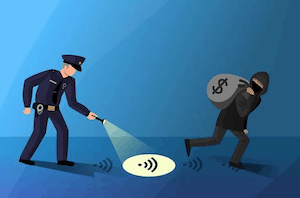The Increasing Need for Online Crime and Cybercrime Investigations
Cybercrime investigations are often thought of as investigations into network intrusions, ransomware, and distributed denial of service attacks. However, investigation of cyber crimes also involves any criminal activity through a computer that yields digital evidence, such as child exploitation, human trafficking, fraud, identity theft, drug sales, etc. Many jurisdictions reported that nearly all cybercrime investigations require some degree of cyber support.
Over the last 20 years, there has been an exponential increase in digital technology prevalence such as smartphones, tablets, laptops, wearable technology, cloud storage, interconnected household devices, external storage, video game consoles, and other devices that hold evidence. These developments caused a massive increase in online crimes across the globe.
Our Cybercrime Investigators

Third Way’s research found that on average, only 3 out of 1,000 of the malicious cyber incidents happening in the United States every year, see an arrest, which is an enforcement rate of less than 1%. This cyber enforcement gap allows criminals to engage in malicious behaviour without any fear of being caught or punished.
Our cybercrime investigators are regularly engaged to investigate cybercrime for individuals and corporations who found no relief through the police. We also assist the police in cybercrime investigations by identifying the IP address of anonymous email senders, spoofed phone numbers, and more.
Contact our cybercrime investigators
Cybercrime Definition
In the most basic sense, an online crime involves a computer and a network. The cybercriminal may have used a computer to commit the crime, or a computer might have been the target. The cybercrime definition is: “Cybercrime, also called computer crime, is the use of a computer as an instrument to further illegal ends, like committing fraud, distribution of child pornography and intellectual property, identity theft, or violating privacy. Cybercrime, especially through the Internet, has grown in importance as the computer has become central to commerce, entertainment, and government.”
Most, but not all, online crime is committed by cybercriminals or hackers who want to make money. These hackers may be individuals or organizations. Some cybercriminals are organized, use advanced techniques, and are highly technically skilled. Others are novice hackers.
Cybercrime Investigations and Types of Cybercrime
Types of cybercrime fall under three main categories:
- A computer is the target of the attack. Think of a data breach on a corporate network denial accomplice.
- A computer is the weapon for an attack. For instance, refusal of service (DoS) attacks.
- A computer is an accessory to cybercrime. For example, this could be digital identity theft, which leads to the theft of funds from a bank account.
Identity theft:
Identity theft refers to a perpetrator stealing an individual’s personal identifying information to open accounts in the victim’s name or assume control of their existing accounts. The FBI’s Internet Crime Complaint Center (IC3) recorded an average of 280,000 complaints per year from 2000 through 2016. One in four U.S. residents report that hackers stole their or that of a household member’s personal information in the last year. Sixteen per cent confirmed that they had been a victim of identity theft during the same period. Identity theft can have long-lasting financial impacts on victims, making it hard for them to recover and find employment. Many online crime victims report suffering from emotional trauma as a result of being victimized. Identity theft affects considerably more victims, and the numbers are increasing every year.
Cyber extortion:
Cyber extortion is an online crime where hackers hold your website, data, computer systems, or other sensitive information, hostage until you meet their payment demands. With many cyber extortion cases, a form of ransomware is used and distributed denial-of-service (DDoS) attacks, both of which could severely damage someone’s business.
In our cybercrime investigations, we specialize in dealing with cyber extortionists on a more personal level. Many of our clients are extorted by people they know personally or within their industry.
A case study about European Internet Extortion Racket
Wiring fraud:
Fraud by wire is a type of scam targeting businesses or organizations that regularly perform wire transfer payments. Online criminals compromise email accounts to trick individuals into transferring funds. Wiring fraud results in the most substantial monetary losses but affects fewer victims due to the criminal activity’s specialized nature.
Phishing Attacks:
Phishing attacks, email fraud, scams, and online fraud happen when cybercriminals find ways to hack into the email servers or accounts of small to medium businesses. Cybercriminals gain access to email accounts to look for sensitive information like outstanding or unpaid invoices or other data about financial transactions and business with suppliers, vendors, and clients. When cybercriminals find a sale or a due invoice, the fraudsters will send various fake emails from the hacked email account, or email address replicated to match the service or company related to the sale or overdue invoice. Then the fraudster asks for transfers of funds into a nominated bank account. Usually, an excuse is given that there are banking issues, and therefore an alternative account has to be used. With most phishing attacks, the nominated account is in the same name as the company name or slightly altered, such as an extra letter. It is common for the bank account to be in the same city as the victim or client.
Phishing emails also may have infected attachments or links to malicious sites. Another common strategy is to ask the receiver to respond with confidential information.
See our tips to protect yourself.
Forensics Specialist in Cybercrime Investigations
Our cybercrime investigators have the global expertise and resources needed for cybercrime investigations. For an investigation of cyber crimes, we use a full range of investigative strategies to investigate cybercrime and identify anonymous users behind cybercrimes.
Alternatively, you can submit a report of an Internet-enabled crime to the Internet Crime Complaint Center (IC3).


